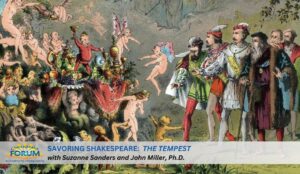How one philosopher defends our common sense notions about perception and reality.
Join Forest for another deftly-handled philosophical discussion – this time about the perception of reality. Be prepared to expand your thinking on the subject!
The writer of George Berkeley’s entry in the Stanford Encyclopedia of Philosophy calls him “one of the great philosophers of the early modern period…. a brilliant critic of his predecessors [and] a talented metaphysician.” His Three Dialogues between Hylas and Philonous, which forms the baisis of this course, is beautifully written. Although in some ways Berkeley’s concern is with a technical issue in philosophy, he claims to be arguing for a common sense notion of reality: that the things we perceive – chairs, other people, beaches, etc., etc. – are really there and have the qualities we perceive them to have, except for those that may vary because of differences in our subjectivity.
As some of you know, Forest and Mike Davis have been considering offering of a Chesapeake Forum course dealing with the question “What is reality?” for quite some time. This semester’s course will lay the groundwork for the Spring course, “What is Reality?”
For many. consideration of this question goes all the way back to the beginning of both Western and Eastern philosophy. In one of Forest’s and Mike’s discussions about this, the name George Berkeley came up. Both Forest and Mike remembered him from past courses, both as students and teachers of “The British Empiricists.” Forest especially liked him for his beautiful writing, as well as his desire to defend common sense. Although the topics of Berkeley’s philosophical works range widely, for the most part he can only be understood in his historical contexts. In this he is unlike other philosophers in the Forum courses Forest has offered: Plato, John Stuart Mill, and – most recently – Aristotle. That’s why today he is remembered – if at all – only by other philosophers. And amongst them he is remembered for two things: first, his devastating critique of the theories of reality (and thereby knowledge) of Descartes and (especially) John Locke, and second, his farsighted understanding of the meanings of words. Western philosophers didn’t catch up with him on the second point until the 20th century.
With this course, Forest believes that we can improve our own thinking about both of these points, because many people, including some contemporary scientists and philosophers, have not taken such arguments to heart. In discussing Berkeley’s Three Dialogues Berween Hylas and Philonous we will clarify the first issue. In the future course on “What is reality?” we will surely take up the second.
What to expect: This is a continued examination of philosophical questions, no prior knowledge required. Before our first class meeting, Forest will send out a summary of Berkeley’s critique of Locke to provide a better understanding of his position and why it was so much on the mark.
While any edition of Three Dialogues between Hylas and Philonous will do, Abe Books has one by MacMillan/Bobbs-Merrill, with an introduction by Colin Turbayne, which I will use. See also Thrift Books, Biblio, and Alibris, ones with Turbayne’s intro.
Feedback from past courses with Forest:
“Forest Hansen is a gifted teacher. His greatest skill is in showing his students that they are really teaching themselves, and each other.”
“One of those teachers with extraordinary intellect and knowledge who graciously includes students of all levels while not sacrificing the contribution of the more advanced. Just wonderful.”
“Another fine Forest Hansen course. Forest knows how to stimulate discussion with thought-provoking questions. Though always respectful of students’ views, he doesn’t hesitate to push us to explain, clarify, and defend our positions.”




